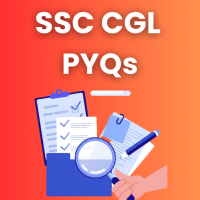SSC CGL Exam > SSC CGL Questions > What would be the indirect speech form of the...
Start Learning for Free
What would be the indirect speech form of the sentence: "She said, 'I will have completed the task by evening'"?
- a)She said that she would complete the task by evening.
- b)She said that she will have completed the task by evening.
- c)She said that she would have completed the task by evening.
- d)She said that she will complete the task by evening.
Correct answer is option 'C'. Can you explain this answer?
Verified Answer
What would be the indirect speech form of the sentence: "She said, 'I ...
In indirect speech, the future perfect tense "will have completed" changes to "would have completed." Therefore, the correct transformation is "She said that she would have completed the task by evening."
View all questions of this test
Most Upvoted Answer
What would be the indirect speech form of the sentence: "She said, 'I ...
Understanding Indirect Speech
Indirect speech, also known as reported speech, involves conveying what someone has said without quoting their exact words. When converting direct speech to indirect speech, certain changes in tense, pronouns, and time expressions are made.
Analyzing the Original Sentence
The direct speech sentence is:
"She said, 'I will have completed the task by evening.'"
Here, the speaker expresses a future perfect action ("will have completed") that will be finished by a specific time ("by evening").
Applying Rules of Indirect Speech
When converting to indirect speech, the following changes apply:
- Tense Shift: Future perfect tense ("will have completed") typically shifts to conditional perfect ("would have completed").
- Pronoun Change: The pronoun "I" changes to "she" as it's being reported by another person.
- Time Expression: "By evening" remains unchanged since it indicates the same time frame.
Choosing the Correct Option
Let's evaluate the options provided:
- a) She said that she would complete the task by evening. (Incorrect - tense change is wrong)
- b) She said that she will have completed the task by evening. (Incorrect - tense not changed)
- c) She said that she would have completed the task by evening. (Correct - properly shifts tense and pronouns)
- d) She said that she will complete the task by evening. (Incorrect - does not reflect the future perfect tense)
Conclusion
The correct answer is option c: "She said that she would have completed the task by evening." This correctly conveys the original meaning while adhering to the rules of indirect speech.
Indirect speech, also known as reported speech, involves conveying what someone has said without quoting their exact words. When converting direct speech to indirect speech, certain changes in tense, pronouns, and time expressions are made.
Analyzing the Original Sentence
The direct speech sentence is:
"She said, 'I will have completed the task by evening.'"
Here, the speaker expresses a future perfect action ("will have completed") that will be finished by a specific time ("by evening").
Applying Rules of Indirect Speech
When converting to indirect speech, the following changes apply:
- Tense Shift: Future perfect tense ("will have completed") typically shifts to conditional perfect ("would have completed").
- Pronoun Change: The pronoun "I" changes to "she" as it's being reported by another person.
- Time Expression: "By evening" remains unchanged since it indicates the same time frame.
Choosing the Correct Option
Let's evaluate the options provided:
- a) She said that she would complete the task by evening. (Incorrect - tense change is wrong)
- b) She said that she will have completed the task by evening. (Incorrect - tense not changed)
- c) She said that she would have completed the task by evening. (Correct - properly shifts tense and pronouns)
- d) She said that she will complete the task by evening. (Incorrect - does not reflect the future perfect tense)
Conclusion
The correct answer is option c: "She said that she would have completed the task by evening." This correctly conveys the original meaning while adhering to the rules of indirect speech.

|
Explore Courses for SSC CGL exam
|

|
Question Description
What would be the indirect speech form of the sentence: "She said, 'I will have completed the task by evening'"?a)She said that she would complete the task by evening.b)She said that she will have completed the task by evening.c)She said that she would have completed the task by evening.d)She said that she will complete the task by evening.Correct answer is option 'C'. Can you explain this answer? for SSC CGL 2025 is part of SSC CGL preparation. The Question and answers have been prepared according to the SSC CGL exam syllabus. Information about What would be the indirect speech form of the sentence: "She said, 'I will have completed the task by evening'"?a)She said that she would complete the task by evening.b)She said that she will have completed the task by evening.c)She said that she would have completed the task by evening.d)She said that she will complete the task by evening.Correct answer is option 'C'. Can you explain this answer? covers all topics & solutions for SSC CGL 2025 Exam. Find important definitions, questions, meanings, examples, exercises and tests below for What would be the indirect speech form of the sentence: "She said, 'I will have completed the task by evening'"?a)She said that she would complete the task by evening.b)She said that she will have completed the task by evening.c)She said that she would have completed the task by evening.d)She said that she will complete the task by evening.Correct answer is option 'C'. Can you explain this answer?.
What would be the indirect speech form of the sentence: "She said, 'I will have completed the task by evening'"?a)She said that she would complete the task by evening.b)She said that she will have completed the task by evening.c)She said that she would have completed the task by evening.d)She said that she will complete the task by evening.Correct answer is option 'C'. Can you explain this answer? for SSC CGL 2025 is part of SSC CGL preparation. The Question and answers have been prepared according to the SSC CGL exam syllabus. Information about What would be the indirect speech form of the sentence: "She said, 'I will have completed the task by evening'"?a)She said that she would complete the task by evening.b)She said that she will have completed the task by evening.c)She said that she would have completed the task by evening.d)She said that she will complete the task by evening.Correct answer is option 'C'. Can you explain this answer? covers all topics & solutions for SSC CGL 2025 Exam. Find important definitions, questions, meanings, examples, exercises and tests below for What would be the indirect speech form of the sentence: "She said, 'I will have completed the task by evening'"?a)She said that she would complete the task by evening.b)She said that she will have completed the task by evening.c)She said that she would have completed the task by evening.d)She said that she will complete the task by evening.Correct answer is option 'C'. Can you explain this answer?.
Solutions for What would be the indirect speech form of the sentence: "She said, 'I will have completed the task by evening'"?a)She said that she would complete the task by evening.b)She said that she will have completed the task by evening.c)She said that she would have completed the task by evening.d)She said that she will complete the task by evening.Correct answer is option 'C'. Can you explain this answer? in English & in Hindi are available as part of our courses for SSC CGL.
Download more important topics, notes, lectures and mock test series for SSC CGL Exam by signing up for free.
Here you can find the meaning of What would be the indirect speech form of the sentence: "She said, 'I will have completed the task by evening'"?a)She said that she would complete the task by evening.b)She said that she will have completed the task by evening.c)She said that she would have completed the task by evening.d)She said that she will complete the task by evening.Correct answer is option 'C'. Can you explain this answer? defined & explained in the simplest way possible. Besides giving the explanation of
What would be the indirect speech form of the sentence: "She said, 'I will have completed the task by evening'"?a)She said that she would complete the task by evening.b)She said that she will have completed the task by evening.c)She said that she would have completed the task by evening.d)She said that she will complete the task by evening.Correct answer is option 'C'. Can you explain this answer?, a detailed solution for What would be the indirect speech form of the sentence: "She said, 'I will have completed the task by evening'"?a)She said that she would complete the task by evening.b)She said that she will have completed the task by evening.c)She said that she would have completed the task by evening.d)She said that she will complete the task by evening.Correct answer is option 'C'. Can you explain this answer? has been provided alongside types of What would be the indirect speech form of the sentence: "She said, 'I will have completed the task by evening'"?a)She said that she would complete the task by evening.b)She said that she will have completed the task by evening.c)She said that she would have completed the task by evening.d)She said that she will complete the task by evening.Correct answer is option 'C'. Can you explain this answer? theory, EduRev gives you an
ample number of questions to practice What would be the indirect speech form of the sentence: "She said, 'I will have completed the task by evening'"?a)She said that she would complete the task by evening.b)She said that she will have completed the task by evening.c)She said that she would have completed the task by evening.d)She said that she will complete the task by evening.Correct answer is option 'C'. Can you explain this answer? tests, examples and also practice SSC CGL tests.

|
Explore Courses for SSC CGL exam
|

|
Signup for Free!
Signup to see your scores go up within 7 days! Learn & Practice with 1000+ FREE Notes, Videos & Tests.


















